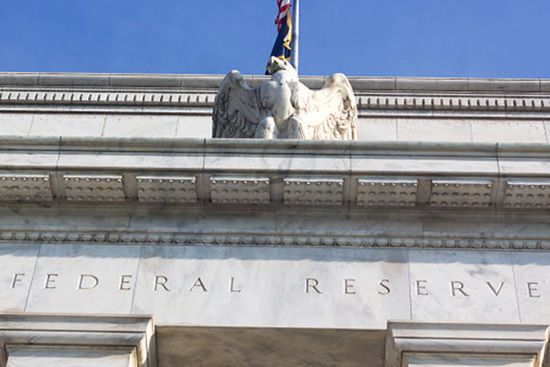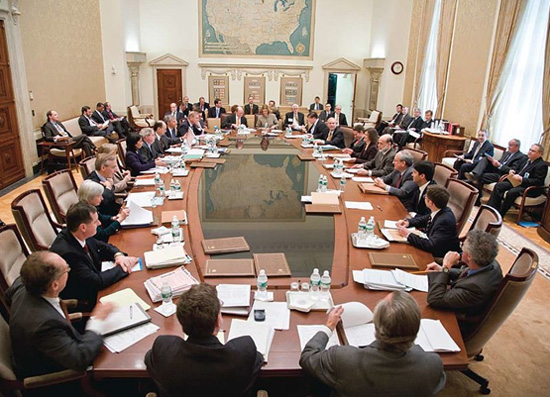| -- | December 6, 2016 Time to Trump the Fed By Patrick Watson The Trump administration’s economic team is beginning to take shape, but we still don’t have nominees for two Federal Reserve Board vacancies. Whoever gets them will have a chance to truly disrupt the global economy. That’s a big deal—so why haven’t we heard more about Trump’s plans for the Fed? If he really wants to “drain the swamp,” the Federal Reserve is a big part of it. Years of its near-zero interest rates and quantitative easing did little to ease most Americans’ economic woes and may have actually worsened them. The Fed may be independent, but it’s still accountable. Or should be. 
Photo: Getty Images Full Employment? Part of the Fed’s statutory mandate is to promote full employment, so it’s ironic they can’t even fill their own job openings. The Board of Governors has seven positions. Two have been vacant since 2014 when Jeremy Stein and Sarah Bloom Raskin both left. Why are the chairs still unfilled? It isn’t entirely the Fed’s fault. President Obama nominated two new governors, but the Senate refused to hold hearings for either one. Sen. Richard Shelby (R-MS) was reportedly the main barrier. Obama could have worked with Shelby to find compromise candidates, but for whatever reason, he didn’t. As a result, for over two years now, the Federal Reserve Board has had just five members. Here they are, with the dates their terms expire: - Stanley Fischer (January 31, 2020)
- Daniel Tarullo (January 31, 2022)
- Janet Yellen (January 31, 2024)
- Lael Brainard (January 31, 2026)
- Jerome Powell (January 31, 2028)
There’s another wrinkle to this. Janet Yellen’s term as the board’s chair is separate from her board membership. Her time as the Fed chair expires February 3, 2018. Likewise, Stanley Fischer’s term as vice chair ends June 12, 2018. Past chairs and vice chairs usually left the board completely when their leadership terms expired—but they don’t have to. Fischer can stay until 2020 and Yellen until 2024. More likely, both will retire in 2018, giving Trump an opportunity to fill those seats, too. That means two years from now, Donald Trump appointees will likely make up the majority of the Federal Reserve Board—assuming the Senate confirms them. Trump will also have appointed a new Fed chair and vice chair. It wasn’t supposed to happen this way. Fed governors have staggered 14-year terms precisely because the designers wanted to ensure no one president had too much influence. Their mistake was in assuming people would stick around that long. They don’t. Other career opportunities come up and board members resign early, leaving openings for presidents to fill. Very rarely does anyone complete a full term. Alan Greenspan was the last one. 
Photo: Wikimedia Commons “Due Regard” The Federal Reserve Act gives the president authority to appoint the Board of Governors, but it doesn’t stop there. It tells him what kind of people he should pick. “In selecting the members of the Board, not more than one of whom shall be selected from any one Federal Reserve district, the President shall have due regard to a fair representation of the financial, agricultural, industrial, and commercial interests, and geographical divisions of the country.” (US Code, Title 12, §241) Now ask yourself: Has the Fed ever been a “fair representation” of the country? Not that I can recall. It’s consisted mainly of professors, lawyers, and career bureaucrats who attended the same small group of elite universities. Right now, for instance, the board has three economists (Yellen, Fischer, and Brainard) with doctorates from Yale, MIT, and Harvard, respectively. Tarullo and Powell are both lawyers with Georgetown degrees. I am sure they are all intelligent and kind-hearted people—but they’re anything but a fair representation of the country. The Federal Reserve Board of Governors has no one to represent the nation’s agricultural, industrial and commercial interests—as the law says it should. President-elect Trump has a chance to change this. 
Photo: Getty Images Who should Trump appoint to the Fed? I’ll tell you who he should rule out: The Fed has plenty of those groups. It needs people with private-sector experience. Just as the regional Federal Reserve Banks represent the financial industry’s interests, the Board of Governors should represent the public’s interests. Past presidents lost this balance. With the right appointments, President Trump can try to restore it. As I was wrapping up this article, I saw a Wall Street Journal report that named some Fed candidates, including… - Former BB&T Bank (BBT) CEO John Allison
- Former SEC Commissioner Paul Atkins
- FDIC Vice Chairman Thomas Hoenig
John Allison is a banker, but not a typical one. He’s a libertarian who has said he wants to abolish the Fed completely. Having him on the board would be interesting, to say the least. Stumbling onto Something Big? I think we will see a struggle over the next four years. The Fed won’t change easily. The Trump administration will have much to do and we don’t know yet where Federal Reserve reform will fit on its priority list. Much of the debate will happen behind closed doors—something of which the Fed has many. I actually ran into one of those doors while I was researching another central bank topic. I called the Fed’s press office last week to ask some simple questions. There was one in particular that the press officer would not answer directly. It wasn’t anything you would expect to be secret. 
Photo: Getty Images I’m not an investigative reporter, but I do have a pretty good BS detector. It goes off when I see a powerful agency like the Fed hiding what should be innocuous information. That made me dig deeper. Long story short, I think I’ve stumbled on something important. I’ll keep probing and tell you more in Connecting the Dots next week. Something else happens next week, too: the Mauldin VIP offer is going to expire on December 13. I suggest you seize the opportunity to get six premium Mauldin services at one low price (discounts range from 63% to 74%, depending on the length of your subscription) before it’s too late. Here’s all the info you need. See you at the top,  Patrick Watson P.S. If you’re reading this because someone shared it with you, click here to get your own free Connecting the Dots subscription. You can also follow me on Twitter: @PatrickW.  | Subscribe to Connecting the Dots—and Get a Glimpse of the Future
We live in an era of rapid change… and only those who see and understand the shifting market, economic, and political trends can make wise investment decisions. Macroeconomic forecaster Patrick Watson spots the trends and spells what they mean every week in the free e-letter, Connecting the Dots. Subscribe now for his seasoned insight into the surprising forces driving global markets. |
 Senior Economic Analyst Patrick Watson is a master in connecting the dots and finding out where budding trends are leading. Patrick is the editor of Mauldin Economics’ high-yield income letter, Yield Shark, and co-editor of the premium alert service, Macro Growth & In come Alert. You can also follow him on Twitter (@PatrickW) to see his commentary on current events. Senior Economic Analyst Patrick Watson is a master in connecting the dots and finding out where budding trends are leading. Patrick is the editor of Mauldin Economics’ high-yield income letter, Yield Shark, and co-editor of the premium alert service, Macro Growth & In come Alert. You can also follow him on Twitter (@PatrickW) to see his commentary on current events. Share this newsletter
  
Use of this content, the Mauldin Economics website, and related sites and applications is provided under the Mauldin Economics Terms & Conditions of Use. Unauthorized Disclosure Prohibited The information provided in this publication is private, privileged, and confidential information, licensed for your sole individual use as a subscriber. Mauldin Economics reserves all rights to the content of this publication and related materials. Forwarding, copying, disseminating, or distributing this report in whole or in part, including substantial quotation of any portion the publication or any release of specific investment recommendations, is strictly prohibited.
Participation in such activity is grounds for immediate termination of all subscriptions of registered subscribers deemed to be involved at Mauldin Economics’ sole discretion, may violate the copyright laws of the United States, and may subject the violator to legal prosecution. Mauldin Economics reserves the right to monitor the use of this publication without disclosure by any electronic means it deems necessary and may change those means without notice at any time. If you have received this publication and are not the intended subscriber, please contact service@mauldineconomics.com. Disclaimers The Mauldin Economics website, Yield Shark, Thoughts from the Frontline, Patrick Cox’s Tech Digest, Outside the Box, Over My Shoulder, World Money Analyst, Street Freak, Just One Trade, Transformational Technology Alert, Rational Bear, The 10th Man, Connecting the Dots, This Week in Geopolitics, Stray Reflections, and Conversations are published by Mauldin Economics, LLC. Information contained in such publications is obtained from sources believed to be reliable, but its accuracy cannot be guaranteed. The information contained in such publications is not intended to constitute individual investment advice and is not designed to meet your personal financial situation. The opinions expressed in such publications are those of the publisher and are subject to change without notice. The information in such publications may become outdated and there is no obligation to update any such information. You are advised to discuss with your financi al advisers your investment options and whether any investment is suitable for your specific needs prior to making any investments.
John Mauldin, Mauldin Economics, LLC and other entities in which he has an interest, employees, officers, family, and associates may from time to time have positions in the securities or commodities covered in these publications or web site. Corporate policies are in effect that attempt to avoid potential conflicts of interest and resolve conflicts of interest that do arise in a timely fashion.
Mauldin Economics, LLC reserves the right to cancel any subscription at any time, and if it does so it will promptly refund to the subscriber the amount of the subscription payment previously received relating to the remaining subscription period. Cancellation of a subscription may result from any unauthorized use or reproduction or rebroadcast of any Mauldin Economics publication or website, any infringement or misappropriation of Mauldin Economics, LLC’s proprietary rights, or any other reason determined in the sole discretion of Mauldin Economics, LLC. Affiliate Notice Mauldin Economics has affiliate agreements in place that may include fee sharing. If you have a website or newsletter and would like to be considered for inclusion in the Mauldin Economics affiliate program, please go to http://affiliates.pubrm.net/signup/me. Likewise, from time to time Mauldin Economics may engage in affiliate programs offered by other companies, though corporate policy firmly dictates that such agreements will have no influence on any product or service recommendations, nor alter the pricing that would otherwise be available in absence of such an agreement. As always, it is important that you do your own due diligence before transacting any business with any firm, for any product or service. © Copyright 2016 Mauldin Economics | -- |
